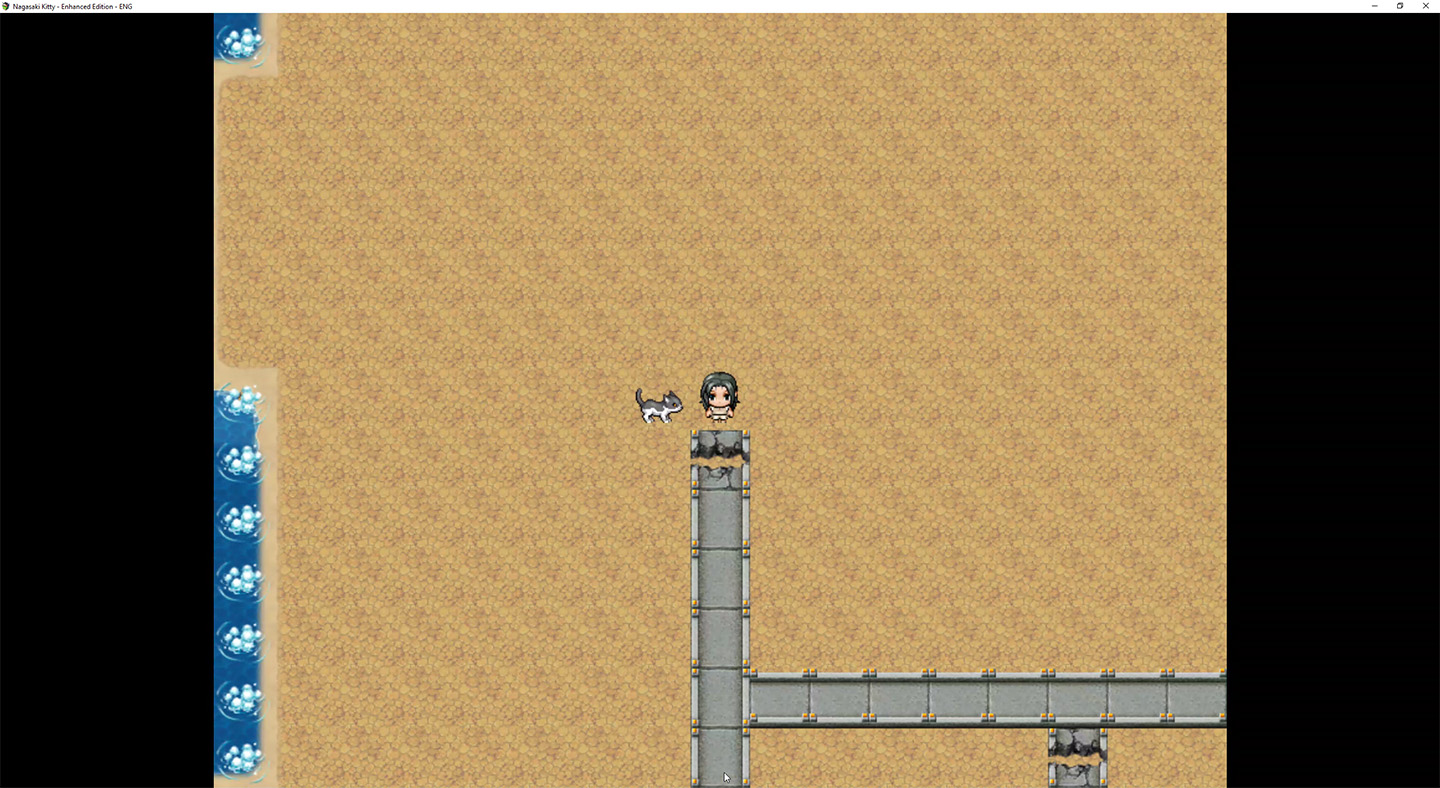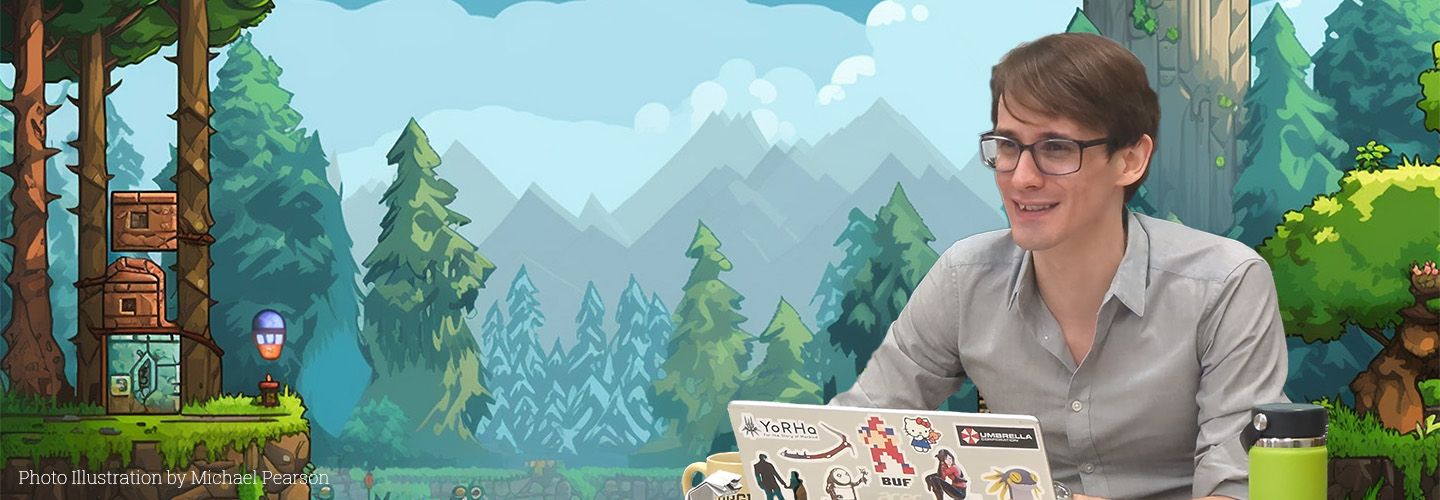'Nagasaki Kitty' Maker Helps Students Understand the World Through Games

Imagine yourself as a child, wandering the streets of your shattered hometown alone in search of your mother. That’s the premise of Nagasaki Kitty, a video game created by an Ivan Allen College of Liberal Arts game design scholar to encourage people to look at history from a different perspective.
In the game, players assume the role of Ayako, a 10-year-old Japanese girl who emerges into the rubble of Nagasaki to search for her missing mother shortly after the atomic bombing during World War II. Unlike most games about war, there’s no combat, no leading a squad of computer-controlled soldiers into battle, no roaring in to save the day in your fighter jet. There’s just a little girl and a cat left to pick through the ruins of a devastated city and everything they had ever known.
“The idea with the game is to create something that is about the victims of the atomic bombings for North American audiences so that it communicates the history of the bombings without focusing on the bombs and the science and the view from above, so to speak,” said Ryan Scheiding, who teaches game design to students in the School of Literature, Media, and Communication.
“It’s not uncommon for histories to talk about the atomic bombs, the planes, the crews, the reasons for dropping the bombs, and not to talk about the victims at all,” says Scheiding, who earned bachelor’s and master’s degrees in history before his Ph.D. in communication studies.
Thinking Beyond Traditional Video Game Mechanics
Scheiding started working on the game before he came to Georgia Tech, but it’s the sort of project that is central to his work here. Scheiding teaches undergraduate students in the Literature, Media and Communication degree program and the Computational Media program, as well as students in LMC’s graduate Digital Media program and others with an interest in game design.
Far from being mere idle entertainment, Scheiding and these students know that video games can provide an opportunity to experience life from a different perspective, helping build empathy and compassion.
“We challenge our students to think beyond traditional game mechanics and to create experiences that make players think and become emotionally involved. We believe in the transformative power of games as a medium to convey complex narratives and historical truths in a way that is both engaging and respectful,” Scheiding said. “Nagasaki Kitty exemplifies this approach.”
Based on Historical Research
Scheiding began work on the game in 2016, while he was studying for his doctoral degree at Concordia University. He initially sought to develop it as a text-based Twine game, then as a 3D game in Unity, but Covid-19 interrupted his work. He eventually worked with collaborators to create it as a 2D game using the RPG Maker MV platform.
He read extensive accounts by survivors and visited Nagasaki to get a better sense of the city’s geography before tackling the game, which sees Ayako rescuing a cat, trying to help neighbors, and navigating past bodies of those who died in the bombing as she searches for her mother.
The game doesn’t offer an opinion about whether the U.S. decision to use atomic weapons was right or wrong. Instead, it allows players who may have only understood the bombings through movies such as the recent Oppenheimer or the critically acclaimed 1952 film Above and Beyond — which focused as much on the Hiroshima mission’s effect on the U.S. pilot’s marriage as anything else — to experience a different view of the aftermath. The game invites them to consider the human toll in a different way.
“One of the tremendous advantages of video games is that they allow a player to experience and learn about the past in unique and compelling ways,” Scheiding said. “This can help develop empathy and understanding of complex issues, which is crucial in today’s interconnected society.”
Video Game Design at Georgia Tech’s Ivan Allen College
Scheiding teaches LMC 4725/6325: Game Design as Cultural Practice, in which he works to give students the skills to brainstorm and design games that aren’t just interesting to play, but also make an argument about a critical cultural issue. Students then put those skills to the test by creating playable games.
During the Fall semester, some of the projects included games about colonialism, coming of age, depletion of natural resources, and mental health (you can check out videos of some of the games on YouTube). Students also must develop a website and a trailer for their creations — emphasizing the importance of effective communication in business.
“I teach tools-based game design, which emphasizes all aspects of game design through consideration of tools, both traditional and non-traditional, in the creative process,” Scheiding said. “I also have the students read critical theory and scholarship about games so that they can create games based on critical cultural issues.”
Living at the corner of narrative and technology, video games are a perfect object of study by students in LMC, a School whose mission revolves around the importance of humanistic perspectives on technology.
Engaging in interdisciplinary research and classwork that spans cultural and technological perspectives and practices is crucial to LMC’s goal of developing leaders who understand and shape developments in both realms. Just as importantly, it helps foster a humanistic approach to problem-solving.
“The world is filled with complex issues that often appear monolithic in nature, but in reality, are fundamentally about both technology and human experiences. The problems we face individually and as a society can’t be solved purely through technology, but only by combining those technologies with theory, work in which LMC and the Ivan Allen College excel.”

Interested in Game Design?
Georgia Tech's School of Literature, Media, and Communication offers the Bachelor of Science in Computational Media with the College of Computing and the School of Music.
This program offers a thorough education in all aspects of the computer as a medium: the technical, the historical-critical, and the applied.
Students in the undergraduate Literature, Media, and Communication degree program can also declare a design thread as part of their degree!
Prospective graduate students can choose the Master of Science or the Ph.D. in Digital Media.
This program gives students a foundation in digital media design and making, a theoretical background in digital media, and the opportunity to practice what is learned in studio courses, labs, and research.

Study with Ryan Scheiding
You can study game design with Scheiding! Here are some classes he teaches:
LMC 4725/6325 Game Design as a Cultural Practice — Emphasis is on the design elements common to games and the expressive possibilities and cultural concerns specific to digital games.
LMC 6650 Project Studio — This course offers students the opportunity to work on focused research within existing long-term projects.
LMC 6316 Historical Approaches to Digital Media — Examines digital media in the context of earlier media, such as handwriting and printing as well as photography, radio, film, and television.

